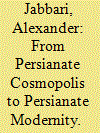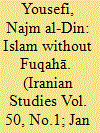| Srl | Item |
| 1 |
ID:
185874


|
|
|
|
|
| Summary/Abstract |
This article examines twentieth-century Persian translations of Urdu-language works about Persian literature, focusing on two different Persian translations of an influential Urdu-language work on Persian literary history, Shiʿr al-ʿAjam (Poetry of the Persians), by Shibli Nuʿmani. The article offers a close, comparative reading of the Afghan and Iranian translations of Shiʿr al-ʿAjam in order to understand why two Persian translations of this voluminous text were published within such a short time period. These translations reveal how Indians, Afghans, and Iranians were invested in the same Persianate heritage, yet the emergence of a “Persianate modernity” undergirded by a cultural logic of nationalism rather than cosmopolitanism, along with Iran’s and Afghanistan’s differing relationships to India and Urdu, produced distinct approaches to translation.
|
|
|
|
|
|
|
|
|
|
|
|
|
|
|
|
| 2 |
ID:
151448


|
|
|
|
|
| Summary/Abstract |
This paper seeks to advance the existing scholarship on Persian secretary and belles-lettrist, ʿAbd Allāh Ibn al-Muqaffaʿ (d. 139/757) and his Risāla fī ’l-Ṣaḥāba (Epistle Concerning the Entourage). It argues that the Risāla, addressed to the second Abbasid caliph al-Manṣūr, set out to tackle the political ills of the caliphate, especially the crisis of political legitimacy. As the first documented articulation of the Islamic polity, the Risāla made a series of recommendations, including a proposal for legal codification that attempted to reinvent the caliphate by reuniting the institution's political and legal authority at the expense of private jurists (fuqahāʾ). The paper illustrates how Ibn Muqaffaʿ’s solution relied on a creative integration of Iranian and Islamic ideas of statecraft and legitimate rule. Ironically, this creative integration may have played a part in the Risāla’s failure to garner necessary support to effect change.
|
|
|
|
|
|
|
|
|
|
|
|
|
|
|
|
| 3 |
ID:
106947


|
|
|
|
|
| Publication |
2011.
|
| Summary/Abstract |
Recently, there have been many compelling new theories of the emergence of an "Islamic public sphere." Few studies, however, have examined the role of literary writing in contributing to its emergence, even though such writing was critical to the intellectual elite's shift toward Islamic subjects in mid-20th century Egypt. In addition, little of this scholarship has examined the gendered nature of this public sphere in any depth, though gendered rights, roles, and responsibilities were among the most hotly contested debates in public discourses on religion. This article looks at how literary writing not only shaped particular interpretations of gendered relationships in Islam but also developed hermeneutical techniques for reinterpreting religious sources. It specifically examines the work of Egyptian literary scholar and Islamic thinker Bint al-Shati? and how her writings helped define the nature of the family, gender relations, and the private sphere in Islamic public discourse.
|
|
|
|
|
|
|
|
|
|
|
|
|
|
|
|